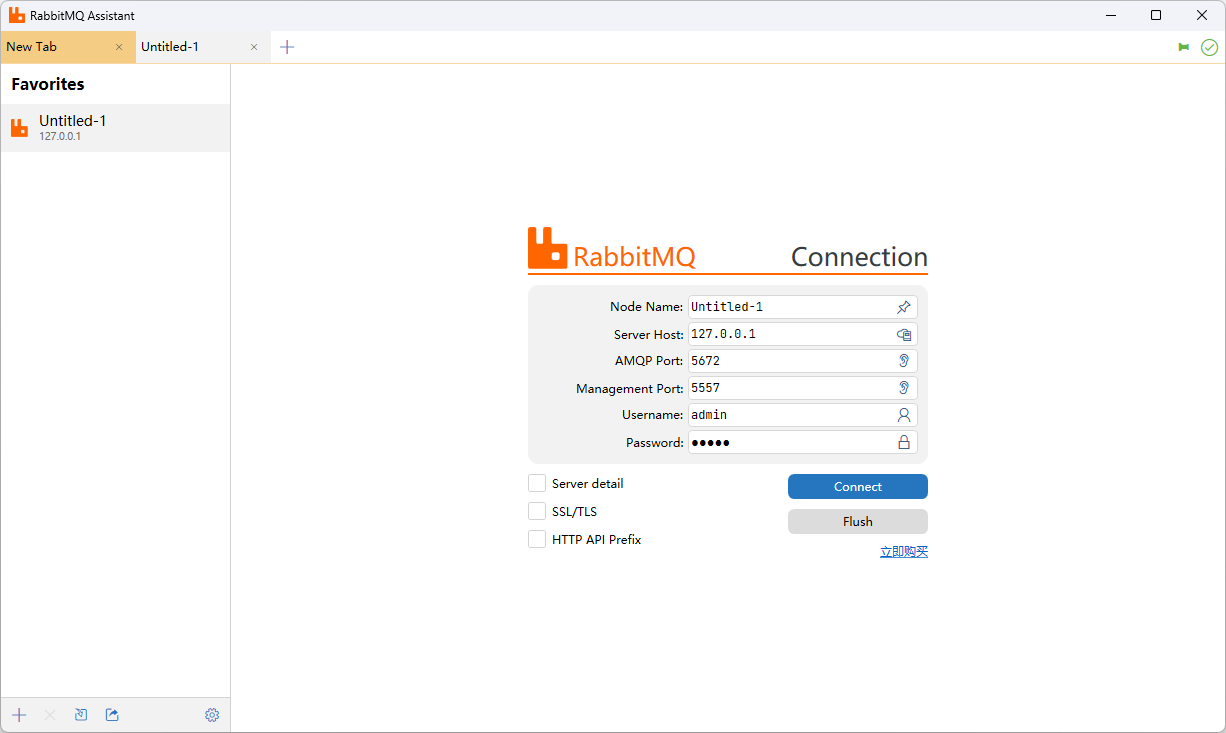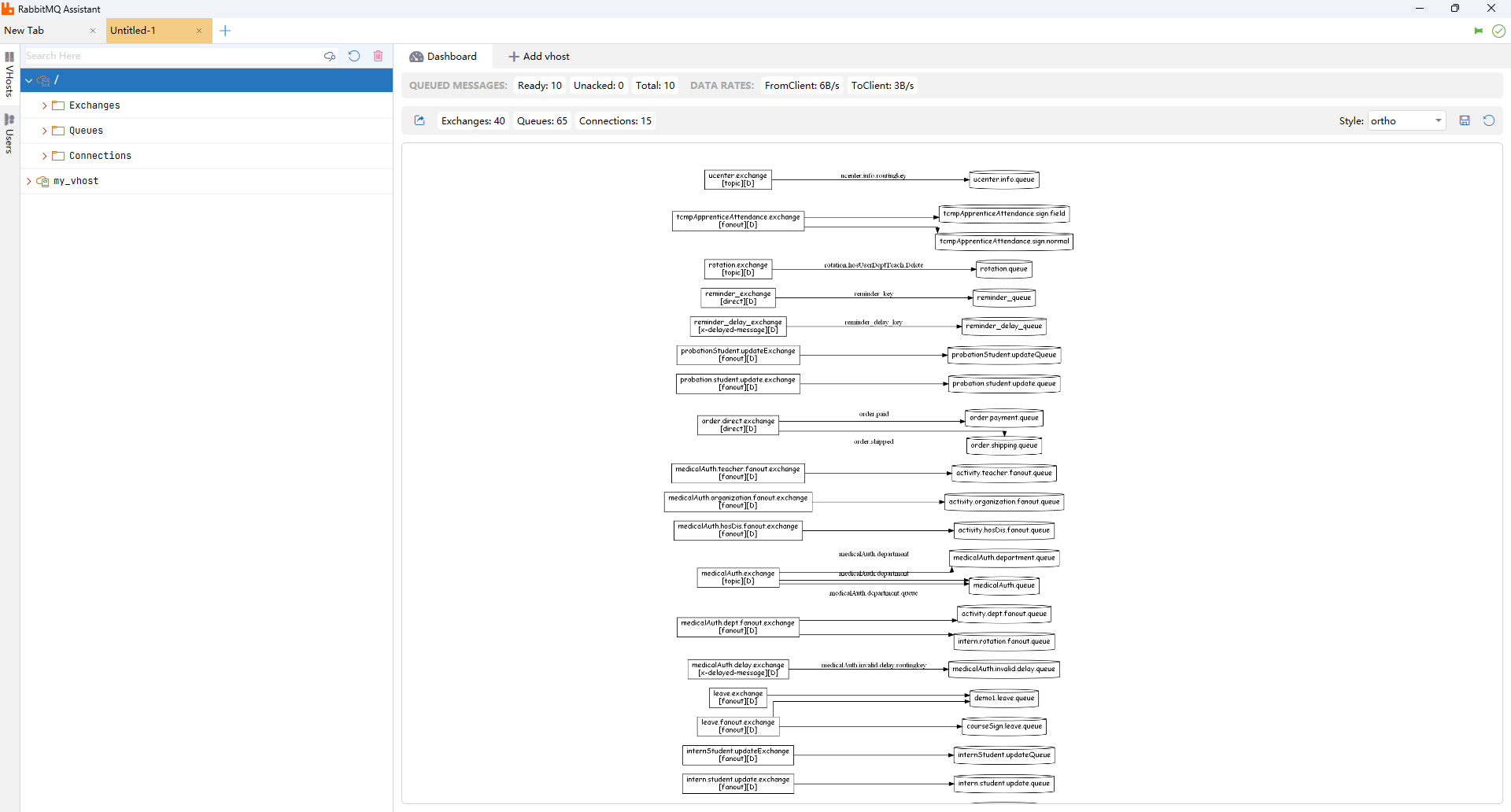RabbitMQ Assistant是RabbitMQ可视化管理与监控工具
主要功能
主要功能包括:
- GPU渲染:RabbitMQ Assistant 在渲染界面时充分利用您的 GPU。这带来流畅的的用户体验,同时使用比以前更少的功率。
- 生成拓扑图:为指定的vhost一键生成拓扑图,支持导出png、svg、pdf、tk等多种格式,让您的消息流动一目了然。
- 测试生产者和消费者:您可以测试解决方案的各个部分,模拟进出的第三方消息。您可以创建和编辑测试消息,一个接一个或批量发送。
- 数据格式化:RabbitMQ Assistant 会自动识别并格式化不同的消息格式,包括Text、JSON、XML、HEX、MessagePack,以及各种整数、浮点类型。
- 查看系统状态:您可以一目了然地查看系统状态,检查某些队列是否变得太大,死信队列中是否有消息等。通过自动刷新功能,可以近乎实时地查看整个系统的工作方式。
- 创建消息:创建消息时,可以指定消息头、属性和载荷;或者一次发送数千条消息进行性能测试,以了解系统如何处理负载。
连接远程MQ
由于 RabbitMQ Assistant 仅在连接本地时提供免费服务,而连接远程地址则需收费,因此使用 Nginx 将本地端口反向代理到远程地址。
1、下载 Nginx
访问 Nginx 官方网站 或 Nginx 中文网,选择适合的版本并下载。将下载的压缩包解压到目标目录(如 D:\Tools\Nginx)。 注意: 路径中不要包含中文字符或空格。
2、启动 Nginx
打开命令提示符,进入 Nginx 解压目录:
sh
cd D:\Tools\Nginx
start nginx如果防火墙弹出提示,请允许访问网络。
在浏览器中访问 http://localhost,若显示欢迎页面,则启动成功。
3、修改配置文件
配置文件位于 conf/nginx.conf。打开该文件,找到 server 节点,根据需要修改或添加配置。例如:
反向代理示例:
conf
server {
listen 80;
server_name example.com;
location / {
proxy_pass http://127.0.0.1:8080;
}
}负载均衡示例:
conf
upstream backend {
server 127.0.0.1:8080;
server 127.0.0.1:8081;
}
server {
listen 80;
server_name example.com;
location / {
proxy_pass http://backend;
}
}我们的需求只需要反向代理,因此增加server代理本地端口5557到远程http://192.168.100.105:15672
nginx.conf如下
conf
#user nobody;
worker_processes 1;
#error_log logs/error.log;
#error_log logs/error.log notice;
#error_log logs/error.log info;
#pid logs/nginx.pid;
events {
worker_connections 1024;
}
http {
include mime.types;
default_type application/octet-stream;
#log_format main '$remote_addr - $remote_user [$time_local] "$request" '
# '$status $body_bytes_sent "$http_referer" '
# '"$http_user_agent" "$http_x_forwarded_for"';
#access_log logs/access.log main;
sendfile on;
#tcp_nopush on;
#keepalive_timeout 0;
keepalive_timeout 65;
#gzip on;
#server {
# listen 80;
# server_name localhost;
#
# #charset koi8-r;
#
# #access_log logs/host.access.log main;
#
# location / {
# root html;
# index index.html index.htm;
# }
#
# #error_page 404 /404.html;
#
# # redirect server error pages to the static page /50x.html
# #
# error_page 500 502 503 504 /50x.html;
# location = /50x.html {
# root html;
# }
#
# # proxy the PHP scripts to Apache listening on 127.0.0.1:80
# #
# #location ~ \.php$ {
# # proxy_pass http://127.0.0.1;
# #}
#
# # pass the PHP scripts to FastCGI server listening on 127.0.0.1:9000
# #
# #location ~ \.php$ {
# # root html;
# # fastcgi_pass 127.0.0.1:9000;
# # fastcgi_index index.php;
# # fastcgi_param SCRIPT_FILENAME /scripts$fastcgi_script_name;
# # include fastcgi_params;
# #}
#
# # deny access to .htaccess files, if Apache's document root
# # concurs with nginx's one
# #
# #location ~ /\.ht {
# # deny all;
# #}
#}
# another virtual host using mix of IP-, name-, and port-based configuration
#
#server {
# listen 8000;
# listen somename:8080;
# server_name somename alias another.alias;
# location / {
# root html;
# index index.html index.htm;
# }
#}
# HTTPS server
#
#server {
# listen 443 ssl;
# server_name localhost;
# ssl_certificate cert.pem;
# ssl_certificate_key cert.key;
# ssl_session_cache shared:SSL:1m;
# ssl_session_timeout 5m;
# ssl_ciphers HIGH:!aNULL:!MD5;
# ssl_prefer_server_ciphers on;
# location / {
# root html;
# index index.html index.htm;
# }
#}
server {
listen 5557;
server_name localhost;
location / {
proxy_pass http://192.168.100.105:15672;
proxy_set_header Host $host;
proxy_set_header X-Real-IP $remote_addr;
proxy_set_header X-Forwarded-For $proxy_add_x_forwarded_for;
proxy_set_header X-Forwarded-Proto $scheme;
proxy_redirect off;
proxy_buffering off;
proxy_request_buffering off;
proxy_http_version 1.1;
proxy_set_header Connection "";
}
}
}4、重载配置
修改完成后,运行以下命令重载配置:
nginx -s reload常用命令
- 查看版本:nginx -v
- 停止服务:nginx -s stop
- 优雅停止:nginx -s quit
- 重启服务:nginx -s reload
5、查看效果
浏览器访问地址localhost:5557会直接访问到远程mq地址

使用RabbitMQ Assistant连接


